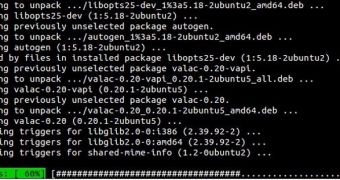APT (Advanced Package Tool), a set of core tools inside Debian that makes it possible to install, remove, and keep applications up to date, has advanced to version 1.0.7.
Advanced Package Tool has been updated yet again, but this time the developers haven't released a big update as they usually do. In fact, the 1.0 branch of APT has been quite impressive in terms of new features, although it hasn't been adopted just yet in any of the major distributions.
The ATP tool is used in Debian and other distros based on this operating system, like Ubuntu for example, but these distros are using older versions (which are still used as apt-get). With the new improvements made to APT, users don't need to use the entire construct in order to make it work, which really make it a lot more friendlier.
It was launched back in 1998 and version 1.0 was reached 16 years later, although it had been a stable package for years. The developers took advantage of the big version change and made a few modifications, like the change of syntax and the introduction of progress indicators.
"The developers have explained that APT (Advanced Package Tool) Apt, which basically resolves dependency problems and retrieves the requested packages, works with dpkg, another tool, which handles the actual installation and removal of packages (applications). Apt is very powerful, and is primarily used on the command line (console/terminal)," reads the entry in the Debian wiki.
According to the changelog, StringToBool only acts if the entire string is consumed by strtol, @builddeps@ is now used in the debian/tests/control file, SmartConfigure has been fixed and it's now capable to ignore the ordering of packages that are already valid, debListParser has been fixed and can now accept "no" as a value for the Multi-Arch field, and a few translations have been updated.
It will take a while until other distros decide to implement this tool by default. For now, you can only install by hand, but once you will start using it, it will be hard to go back to the old apt-get, which will seem out of place.
A complete list of modifications and updates can be found in the official changelog. You can download APT (Advanced Package Tool) 1.0.7 right now from Softpedia, but if you get the source package you won't be able to do much with it.
It's possible to install the new APT tool in parallel with the one you are using now. You will only make it to work with the new syntax. For example, to update the repos you will have to run sudo apt update and not sudo apt-get update.

 14 DAY TRIAL //
14 DAY TRIAL //